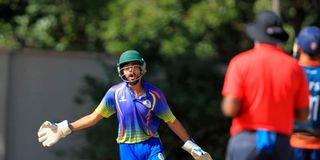Premium
Here’s how to score hundreds, in cricket and in life

What you need to know:
- Sukhdeep “Sonu” Singh, 22, is pursuing a Bachelor in commerce degree at Strathmore University
- Sukhdeep was part of the Kenya Under-19 team that won the age group Cricket World Cup Qualifiers, Africa region, in 2017
- He captained the U19 national team in the Cricket World Cup Qualifiers Africa in Namibia in 2019
- Sukhdeep won the Best Sports Personality of the Year 2019 in the Asian Tawa Awards
Sukhdeep Singh, 22, is one of the best wicketkeeper-batsmen in Kenya right now. He believes that with the right structures and players’ welfare prioritised, Kenyan cricket can reclaim its lost glory.
How did you pick up cricket?
I was engaged in various sports activities in primary school before taking up cricket when I was eight years old. I used to play with my siblings and slowly, my interest in the sport grew. We used to visit the Sikh Union Club Nairobi with family and just spend the weekend playing cricket. I am so glad I found something that makes me so happy.
Where did you get the inspiration to play this game?
As a child, I used to watch cricket matches and slowly, I became interested in learning more about it.
I was inspired by several top cricketers among them AB de Villiers (South Africa), MS Dhoni (India) and Kumar Sangakara (Sri Lanka). I just admired how they played. Seeing them hit the ball for sixes or fours made me so happy. I wanted to be like them.
Someone I also really admired and I am currently playing with is former Kenyan team captain Rakep Patel. He has been a great mentor since I made my debut with the senior national team. He has been like a big brother, always ready to help in any way. He inspires me to win games for Kenya, and to work hard.
How does it feel to captain the Kenya team?
Representing a country as a captain is the best feeling ever. It was a dream come true. Never did I think I would be that person. It was a great honour and a proud moment for my family and I.
Tell us about the challenges you’ve faced…
Balancing my time between playing cricket, and my studies at Strathmore University, where I’m a fourth year student, has always been a challenge to me. Although I love cricket, I also want to study to safeguard my future. I overcome this challenge with the support from my family and my lecturers.
Another challenge is finances. The game in Kenya does not pay. Players are suffering. I’m sure players who used to depend on cricket have had to look for other sources of income to survive. Yes, we get help from the government when the international tours are on, but when they are not, there is no money coming in. One is forced to look for alternatives. That’s not a good thing. I think we can excel on the international stage if we get financial support.
How do you juggle academics and cricket?
It is not easy. Strathmore University is quite strict on performance and class attendance, so I usually get letters from the cricketing body whenever I need to be absent from class, assignments or exams. The lecturers and administrators have really supported me because they know I represent the country. They sometimes allow me to take my exams later. Cricket requires long periods of training, and the balance is tough but due to God’s grace, I am succeeding in both.
Whenever I’m faced with a choice between going for a match and attending a family function, I struggle. But I think my family understands how much I love cricket.
What life lessons have you picked from cricket?
The first is discipline. In cricket you have to be disciplined and do what you are supposed to do. The other life lesson is commitment. You have to be committed to your team and dedicated to training. There are no shortcuts, you have to work hard.
Something interesting about this sport is, when you do well, everyone supports you. But if results don’t go your way, you face very harsh criticism. That is the life of a sportsman. That is the life of a sportsman. I am lucky I have a family that encourages me no matter how I perform. Cricket helps you grow in many ways. For example, whenever you go on a tour, you learn how to manage your money, time and also how to carry yourself. You also learn how to relate with people, and communicate the right way.
Kenya was a World Cup regular from 1996 to 2011. Do you think it is possible to go back to those days?
We have what it takes to compete on the big stage. We proved that in the series we played and won against Nepal in August 2022. Once we get the structure right, we can do great things. We need to start by prioritising players’ welfare. They need to benefit from the sport. We should also involve coaches from other countries to help us develop and nurture local talent.
What are your future plans?
To develop as a great cricketer and win many more games for Kenya. I was in a cricket training camp with Umesh Patwal in Mumbai in February. He is a well-known, straightforward, disciplined and dedicated coach. He taught us a lot of things, including how to win games, what approach to take and what skills to improve on. I want to develop into a cricketer who helps the team win every time. I want to continue playing cricket for as long as I can, but I have to think about other things as well, like graduating with good grades from the university next year!





